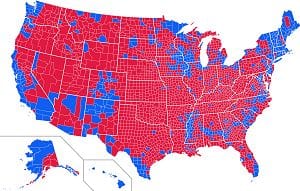Eliminate the Electoral College? You'll Never See Your Candidate Again

As a follower of politics, I love seeing all the hair-brained ideas that sprout up from time-to-time arguing for this change or that, without really considering what would happen if it was actually put into practice.
We live in a federal republic. Big states have a larger share of influence, but smaller states still maintain at least some balance through the equal representation in the Senate.
The Electoral College was part of this framework. Presidential candidates had to win at the state-level, but an enormous win in one state couldn't skew the entire result.
That is, a candidate might win 99% of the vote in California and it wouldn't matter; they only win the delegates apportioned to the state.
This highlights the problems with eliminating the Electoral College; the very nature of campaigning would change, and most Americans would never see a candidate again.
America is facing growing urbanization -- almost 81 percent of the population lives in cities.

Even worse, right at one-third of the U.S.'s total population lives in only ten metropolitan areas!
We're used to the battleground state phenomenon, where states become flyovers because they are pocketed wins. However, if we eliminated the Electoral College, candidates could campaign in the top 20 metro areas and win the lion's share of votes.
This would be a politicking nightmare -- candidates jockeying to dominate the airwaves in the markets with the most people, while others totally ignore the rural and nationwide vote.
The biggest losers, though, would be the Republicans.
The red/blue map is often dominated by where the urban regions are located. Solid swaths of red are typically wide spreads of rural America.
Whether we like to admit it or not, the urban/rural divide is often represented in the red/blue map -- and forcing candidates to campaign along the urban/rural divide would be a stacked deck in favor of the Democrats.
Our Founders knew that they weren't forming a perfect form of government, that's why they allowed for a mechanism for change. But to think that we should change to a system where Democrats could campaign in 20 cities while Republicans scramble to unify the rural areas, how would this improve the existing system?
Photo Credit: Brendan Smialowski/AFP/Getty Images



